What Happened to the Original Midwest Wineries?
During October of 1974, the Saturday Evening Post published a “Guide to American Wineries.” This article was probably the first discussion of bonded Midwestern Wineries to appear in a national publication.
At the time of the Saturday Evening Post’s article, there were 32 wineries in the Midwest. Ohio’s 12 wineries were by far the most numerous of any Midwestern state during 1974. (Today, there are approximately 1,300 wineries in the Midwestern United States.)
Recently, Midwest Wine Press researched the status of some of the “original” Midwest wineries. Some are long gone, but many still remain open for you to visit today.
Illinois
Mogen David Wine Company– Starting in the 1930s, Mogen David made several million gallons of wine annually in Chicago. Most of the wine was made from Concord grapes. Some of these grapes undoubtedly came from Michigan vineyards. At some undocumented time, Mogen David moved from Chicago to Westfield, NY. Today, Mogen David is part of The Wine Group, maker of Cupcake Wines.
Indiana
Michigan
Tabor Hill Winery– This winery now produces over 150,000 gallons of wine per year on the site of the original facility which opened in 1968. During 1984, Tabor Hill bought Bronte Champagne and Wines- which at one time was Michigan’s largest winery- and hired their legendary winemaker, Angelo Spinazze. More recently, Rick Moersch left Tabor Hill in 1992 to start his own Southwest Michigan, Round Barn. Tabor Hill’s Demi Sec, a Vidal Blanc wine, is the winery’s best seller.
Molly Pitcher Wine Corp.– Founded in 1934, this winery went through several relocations and name changes before closing in 1991. At the time it ceased operations, the winery was known as Berrien Vintner Cellars and was located in Harbert. In it’s heyday during the 70’s, Molly Pitcher, produced over 200,000 gallons of wine a year that was sold in 48 states. The old Harbert production facility on Red Arrow Highway is now a 14 unit condo development called The Vineyard Lofts. Some of the old concrete fermentation vats are now part of kitchen and bedroom designs for the condos.
Bronte Champagnes and Wine- Opened in 1933, six months before the repeal of Prohibition, Bronte Wines was sold to Tabor Hill Winery during 1984. During its peak, Bronte was probably the most productive winery in Michigan history producing 800,000 gallons of wine a year in its Detroit facility. Bronte was the first to bottle the popular ‘Cold Duck” wines of the 1960’s and 70’s.
Frontenac Wines- This winery is the successor company to Risdon Wines, which opened in 1933 and closed in the late 1980’s. Frontenac produced some memorable offbeat wines including Lemon Smash, Cherry Chantilly and an 1977 Elvis Presley commemorative wine called Always Elvis. (An unopened bottle of Frontenac’s Always Elvis was for sale on eBay during 2016 for $89.)
Missouri
Minnesota
Ohio
John Christ Winery– One of of the oldest post-Prohibition wineries in the Midwest, John Christ Winery began production in 1946 near Lake Erie. The original owner, John Christ, was a Macedonian immigrant who came to the U.S. to grow wine grapes. Today, the current winemaker, Jack James, continues to make award winning estate grown wines.
Wisconsin


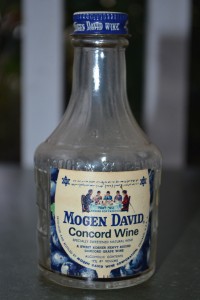
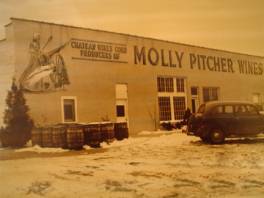
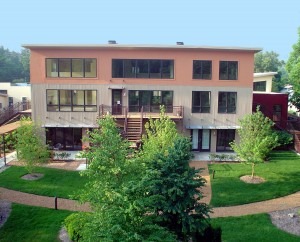
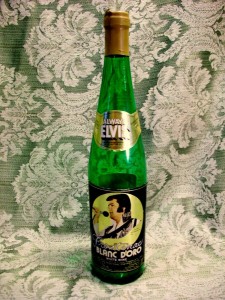
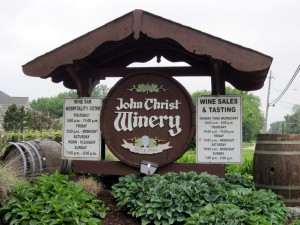


Banholzer Winecellars was a winery in Rolling Prairie that went defunct sometime in the late 80’s or early 90’s. Carl Banholzer was one of the original partners with Len Olson who started Tabor Hill in 1968. The two separated due to differences, and Carl began his own venture. I am probably the only person who ever worked for both wineries. Tabor Hill’s winery was constructed in 1970 and they enjoyed their first retail sales in 1972. Banholzer opened for business in 1975. Both men were a bit eccentric, but were hard working entrepreneurs. Incidentally, I also worked for John Thompson, who owned the Thompson Winery in Monee, but I was not directly affiliated with his winery.
My grandfather, uncle and aunt all had long careers at Western Electric in Cicero. They epitomized the hardworking “Bohemians from Berwyn.” Those were the days that when you got a job, you kept it.
But my dad never liked the place, had a 44-year career at Mogen David Wine Corp. on the south side. He rose from being a grunt to VP of Bottling Operations. They moved the plant to Westfield, NY in the late ’70s — he supervised parts of the move.